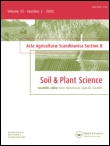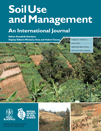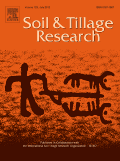
COMPOST SCIENCE & UTILIZATION
Scope & Guideline
Advancing Sustainable Solutions through Compost Science.
Introduction
Aims and Scopes
- Organic Waste Management:
Emphasizes innovative methods for managing organic waste, including composting, vermicomposting, and microbial digestion. The journal explores how these practices can enhance soil quality and agricultural productivity. - Soil Health and Fertility:
Investigates the effects of compost and organic fertilizers on soil properties, nutrient availability, and crop yields. The journal highlights studies that contribute to sustainable soil management practices. - Composting Technologies and Techniques:
Focuses on various composting methods, including large-scale and on-farm composting, and the use of technology such as IoT for monitoring compost processes. This area encourages research on optimizing composting efficiency. - Environmental Impact Assessments:
Examines the environmental benefits of composting practices, such as reducing greenhouse gas emissions and improving waste recycling. The journal seeks contributions that assess the ecological footprint of composting. - Innovative Feedstocks and Additives:
Explores the use of diverse organic materials, including agricultural by-products, municipal waste, and novel feedstocks in composting. Research in this area enhances the understanding of feedstock characteristics and their effects on compost quality.
Trending and Emerging
- Integration of Technology in Composting:
There is a rising trend in the application of technology, such as IoT and sensor systems, to monitor composting processes. This integration enhances efficiency, optimizes conditions, and provides data for better decision-making in waste management. - Vermicomposting and Its Benefits:
Research on vermicomposting has surged, showcasing its advantages in enhancing soil fertility and crop yield. This theme reflects a growing recognition of earthworms' role in organic waste recycling and soil health. - Impact of Organic Amendments on Crop Productivity:
Studies increasingly focus on the effects of various organic amendments, including compost and biochar, on crop productivity. This trend highlights the importance of sustainable practices in enhancing agricultural outputs. - Utilization of Waste Materials in Composting:
Emerging research investigates the use of diverse waste materials, such as textiles and food scraps, as feedstocks in composting. This theme underscores the potential for waste valorization and resource recovery in sustainable practices. - Nutrient Dynamics in Composting:
An increasing number of studies are addressing the nutrient dynamics during the composting process, including the availability of essential nutrients for plant growth. This focus is crucial for optimizing compost formulations for agricultural use.
Declining or Waning
- Traditional Composting Methods:
There has been a noticeable reduction in studies focused solely on conventional composting methods, as newer technologies and innovative practices gain prominence. This shift may reflect an increased interest in efficiency and sustainability. - Single-Feedstock Composting Studies:
Research focusing exclusively on single-feedstock composting has decreased. There is a growing trend towards mixed feedstock approaches, which can yield more diverse benefits and improve compost quality. - Basic Composting Process Analyses:
While foundational studies on composting processes remain relevant, the frequency of purely theoretical analyses has diminished. Researchers now tend to focus on applied studies that demonstrate practical implications and real-world applications.
Similar Journals

NUTRIENT CYCLING IN AGROECOSYSTEMS
Unlocking the Secrets of Agroecosystem ResilienceNUTRIENT CYCLING IN AGROECOSYSTEMS is a premier academic journal published by SPRINGER, dedicated to advancing the field of agroecosystem research. With an ISSN of 1385-1314 and an E-ISSN of 1573-0867, the journal has achieved remarkable standing, being ranked in the Q1 category for both Agronomy and Crop Science and Soil Science as of 2023. Over the years, it has emerged as an essential platform for interdisciplinary research focused on nutrient management, soil health, and sustainable agriculture practices, reflecting a growing global interest in environmental sustainability. The journal's impactful contributions are highlighted by its impressive Scopus rankings, where it stands at #68/406 and in the 83rd percentile for Agronomy and Crop Science, and #37/159 with a 77th percentile in Soil Science. Researchers, professionals, and students are invited to explore open access options for published articles, facilitating wider dissemination of knowledge in nutrient cycling and its critical implications for agroecological systems. Join the discourse by submitting your research and contributing to the ongoing conversation in this vital area of study.

AGROCHIMICA
Illuminating the path to sustainable agricultural practices.AGROCHIMICA is an eminent journal published by PISA UNIV PRESS, dedicated to advancing the fields of Agronomy, Crop Science, Food Science, and Soil Science. With a rich history dating back to its inception in 1973, this journal has evolved through various phases of publication, illustrating its commitment to delivering quality research over several decades. Although currently categorized in the Q4 quartile across its respective disciplines, AGROCHIMICA provides a platform for foundational and innovative studies that contribute to knowledge in agricultural practices and sustainable food systems. While the journal is not open access, it remains a valuable resource for researchers, professionals, and students interested in Italy's and the global agricultural landscape, fostering a greater understanding of the complexities within these interconnected fields. The ISSN associated with this journal is 0002-1857, and it is published from Pisa, Italy, addressing the evolving challenges in agriculture with a spotlight on rigorous scientific inquiry.

ACTA AGRICULTURAE SCANDINAVICA SECTION B-SOIL AND PLANT SCIENCE
Exploring the Interactions of Soil and Crop for a Greener TomorrowACTA AGRICULTURAE SCANDINAVICA SECTION B-SOIL AND PLANT SCIENCE, published by Taylor & Francis AS, is a distinguished journal dedicated to the fields of Agronomy, Crop Science, and Soil Science. With an impressive impact factor, and categorized in Q2 for both Agronomy and Crop Science and Soil Science as of 2023, this journal is an essential resource for researchers, professionals, and students aiming to advance their understanding of soil-plant interactions and sustainable agricultural practices. Operating since 1992 and continuing through to 2024, ACTA aims to publish high-quality, peer-reviewed research that encourages the applicability of advanced scientific knowledge in real-world agricultural settings. While the journal is not open access, it remains widely accessible through institutional subscriptions, reflecting its commitment to disseminating essential findings and fostering innovation in soil and plant science worldwide. Nestled in the vibrant academic environment of Norway, ACTA AGRICULTURAE SCANDINAVICA serves as a key platform for nurturing groundbreaking research that informs sustainable agricultural policies and practices globally.

PLANT SOIL AND ENVIRONMENT
Connecting Soil Health to Ecosystem Prosperity.PLANT SOIL AND ENVIRONMENT is a premier open-access journal dedicated to the interdisciplinary study of soil science, agronomy, and environmental interactions, published by the Czech Academy Agricultural Sciences. With an ISSN of 1214-1178 and E-ISSN 1805-9368, this journal has been a vital platform for dissemination of research since its inception in 2002. Based in the Czech Republic, it has garnered a robust reputation within its field, as indicated by its impressive Q2 ranking in Soil Science and ranking #47 out of 159 in the Scopus Ranks for Agricultural and Biological Sciences, placing it in the 70th percentile overall. The journal explores diverse topics within soils and their significant roles in plant health, ecosystem services, and sustainable agricultural practices, contributing important insights that benefit researchers, practitioners, and policy-makers alike. Aiming for a global outreach, PLANT SOIL AND ENVIRONMENT not only facilitates open dialogue among scientists but also ensures that cutting-edge research is freely accessible to enhance the knowledge base in soil science.

Soil Research
Innovating solutions for soil and environmental challenges.Soil Research, published by CSIRO PUBLISHING, is an esteemed scholarly journal dedicated to advancing the field of soil science, environmental science, and earth-surface processes. With an ISSN of 1838-675X and E-ISSN of 1838-6768, this journal serves as a vital platform for researchers and professionals to disseminate innovative findings and engage with contemporary challenges in soil and environmental management. The journal is recognized for its impactful contributions, as evidenced by its Q2 ranking in 2023 across multiple categories including Earth-Surface Processes, Environmental Science, and Soil Science, reflecting its influence and relevance in these critical academic areas. Operating from its headquarters in Clayton, Victoria, Australia, Soil Research is committed to fostering open access to research, ensuring wider dissemination of knowledge. As it converges toward its future objectives until 2024, the journal aims to provide a forum for diverse perspectives that enhance understanding and stewardship of soil resources, making it an indispensable resource for students, researchers, and industry professionals alike.

Journal of Material Cycles and Waste Management
Pioneering Sustainable Practices in Waste ManagementThe Journal of Material Cycles and Waste Management, published by Springer, stands as a pivotal resource in the fields of material cycles and waste management, addressing critical challenges related to the sustainability of materials and the efficient disposal of waste. With an impact factor reflective of its significant contribution to the scientific community, this journal publishes innovative research that spans a diverse range of topics, from recycling technologies to lifecycle assessment. The journal ranks in the Q2 category for both Mechanics of Materials and Waste Management and Disposal, highlighting its respected position in academia. Operating without open access, the journal seeks to engage researchers, professionals, and students alike, providing a platform to advance knowledge and foster collaboration in the pursuit of sustainable material management solutions. Located in Japan and adhering to a high standard of editorial excellence, the journal is a must-read for those invested in optimizing resource use and minimizing environmental impacts.

SOIL USE AND MANAGEMENT
Innovating solutions for effective soil management.SOIL USE AND MANAGEMENT is a premier academic journal published by Wiley, focusing on the critical domains of Agronomy, Crop Science, Pollution, and Soil Science. With an ISSN of 0266-0032 and an E-ISSN of 1475-2743, the journal has established itself as a vital resource in the field since its inception in 1985. Operating from its U.S. headquarters in Hoboken, NJ, SOIL USE AND MANAGEMENT boasts impressive Q1 rankings across its relevant categories, indicating its standing in the top tier of research journals. Notably, it is ranked 48th out of 406 journals in Agronomy and Crop Science and holds an 88th percentile position, as well as a commendable rank of 26th out of 159 journals in Soil Science, underscoring its influence and reach. This journal serves as an essential platform for researchers, professionals, and students dedicated to sustainable soil management practices and understanding soil's role in agricultural productivity and environmental health. Although it does not offer Open Access, its rigorous peer-review process ensures the publication of high-quality original research, reviews, and case studies critical for advancing knowledge and practice in the field. This journal is crucial for anyone engaged in soil science and its related disciplines, encouraging innovative approaches to challenges facing soil use and management today.

ENVIRONMENTAL ENGINEERING SCIENCE
Transforming challenges into opportunities for environmental progress.ENVIRONMENTAL ENGINEERING SCIENCE is a leading journal published by MARY ANN LIEBERT, INC that provides a platform for pioneering research in the fields of environmental chemistry, pollution control, and waste management. With an ISSN of 1092-8758 and an E-ISSN of 1557-9018, this peer-reviewed journal aims to disseminate high-quality scientific studies that address critical environmental challenges. As evidenced by its 2023 category quartile rankings, it holds a notable position at Q3 in Environmental Chemistry and Pollution and Q2 in Waste Management and Disposal, highlighting its relevance and impact in these domains. Spanning over two decades from 1997 to 2024, the journal is dedicated to fostering innovations and promoting rigorous scholarship that can contribute significantly to sustainable environmental practices globally. Authors and researchers are encouraged to engage with this essential resource, which offers Open Access options to enhance the visibility and reach of their work. For those interested in advancing their understanding and practice within the environmental sciences, ENVIRONMENTAL ENGINEERING SCIENCE is an indispensable journal to consider.

SOIL & TILLAGE RESEARCH
Elevating Knowledge on Tillage and SustainabilitySOIL & TILLAGE RESEARCH is a premier international journal dedicated to advancing the understanding of soil science and tillage practices through high-quality research and insightful reviews. Published by Elsevier and based in the Netherlands, this esteemed journal boasts impressive impact metrics, being ranked in the Q1 category across multiple domains including Agronomy and Crop Science, Earth-Surface Processes, and Soil Science, reflecting its pivotal role in the academic community. With an H-Index that underscores its citation impact and a Scopus ranking placing it in the top percentiles of its field, SOIL & TILLAGE RESEARCH serves as a vital resource for researchers and professionals focusing on sustainable agricultural practices, soil management, and environmental conservation. This journal provides a platform for open dialogue and dissemination of knowledge that shapes future research directions and policy-making in land use and sustainable agriculture.

Journal of Soil Science and Plant Nutrition
Advancing sustainable agriculture through soil and plant science.The Journal of Soil Science and Plant Nutrition, published by SPRINGER INT PUBL AG, is a premier academic journal dedicated to advancing the fields of agronomy, plant science, and soil science. With an impressive Q1 ranking in both Agronomy and Crop Science and Plant Science, alongside a Q2 ranking in Soil Science, this journal stands at the forefront of innovative research and knowledge dissemination. Annually indexed in key databases, it provides a platform for high-quality research articles that explore the complex interactions between soil health and plant nutrition, contributing significantly to sustainable agricultural practices. Although it does not offer open access options, the journal is accessible through various academic institutions and libraries, ensuring a wide readership. With its emphasis on impactful findings, the journal is an essential resource for researchers, professionals, and students aiming to further their understanding and application of soil and plant science in an ever-evolving global context.